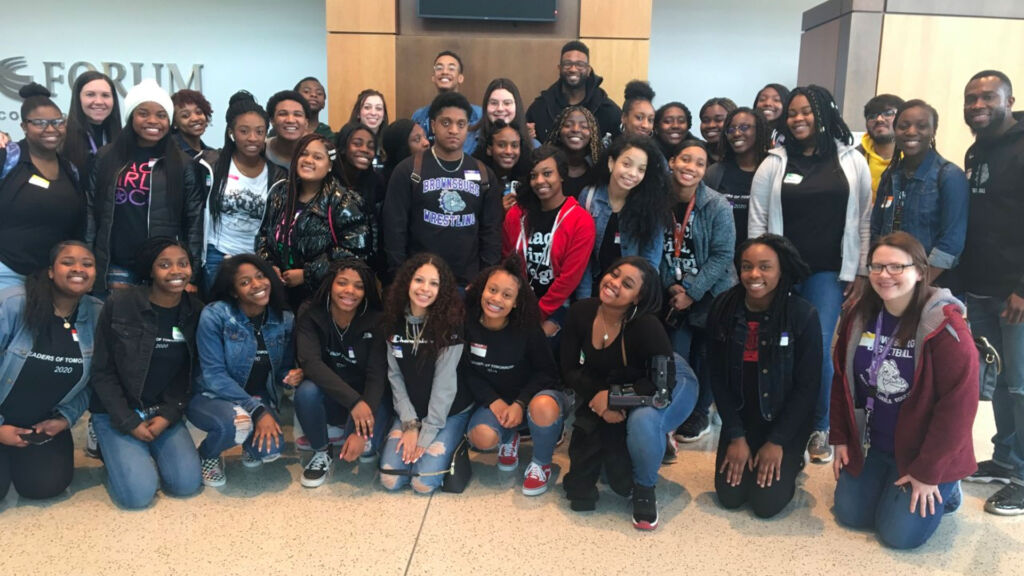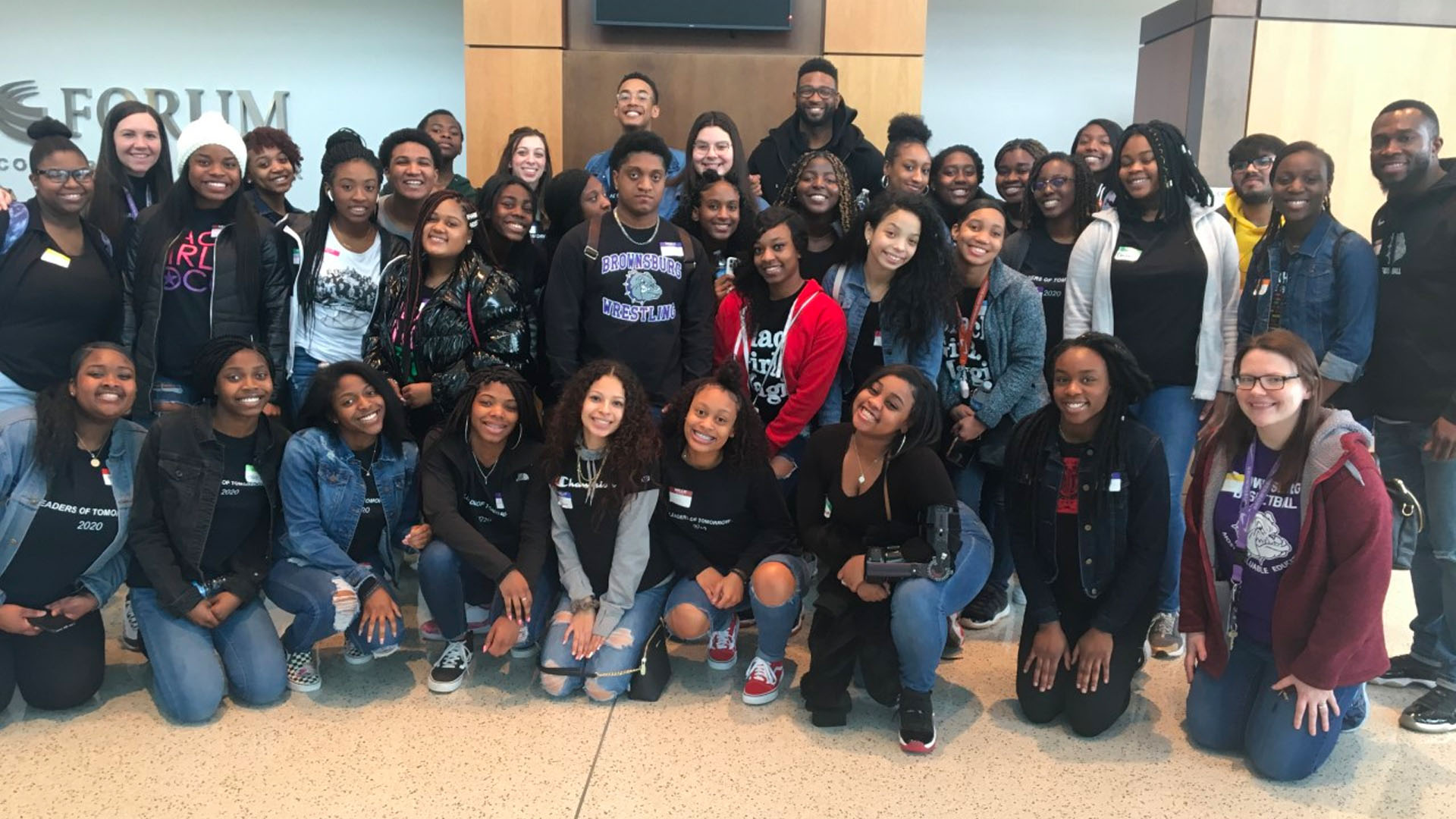In 2017, a group of Black freshmen at Brownsburg High School began to push for change. They were unsettled by the culture of their school, and it led them to ask important questions like why are we underrepresented in our curriculum? Why do we have to assimilate in order to do well academically? Why do our peers call us and our culture “ghetto”? Essentially, they were asking, “Why don’t we belong here?”
In February of their freshman year, they got to work. They began by enlisting English teachers to host a writing contest for essays on Black history. During that spring, they continued to make their concerns known to their administrators, and after many trips to their offices, my students developed a plan to launch a Black Student Union for their high school. This group became known as the Leaders of Tomorrow.
These student leaders continued to express the need for a safe space. They felt exhausted, anxious, and isolated; they were tired of being the only students of color in their advanced placement courses. They described feeling eyes burning through the backs of their heads as they sat through lessons on slavery in America. They endured racist jokes, rhetoric, or micro aggressive behaviors from their teachers and principals—like when an administrator tried to joke with a group of girls talking and laughing together in between classes, and he said, “Stop being so ghetto!” They felt they had to constantly code-switch in the classroom to be understood or even appreciated. They felt teachers didn’t call on them because they couldn’t pronounce their names. And they despised hearing their White teachers and peers read the n-word aloud as if it were just another word.
The group was a success—my classroom was packed every Thursday after school with the sounds of joy and laughter and celebration. I also heard the sounds of grief and anger and frustration, but these sounds were echoed with affirmation and understanding, encouragement, advice, love, and a resounding, “I feel you.” A community, or rather, a family was formed, and Thursdays became the space our students needed, the space where they belonged.
The students also realized their safe space could extend to others outside of their race. They could use this platform to help enact change and have courageous conversations with their peers and teachers. The Leaders of Tomorrow decided to make this their mission:
Leaders of Tomorrow exists to promote a deeper understanding and appreciation of diverse cultures
and backgrounds. We will work to empower young leaders of color and to promote unity within our diverse student body. We exist to engage with the many facets of our school to educate and promote awareness and appreciation of students’ unique identities and to remove stereotypes and break barriers between races.
After two years of meeting regularly, the students began to see fruit from their efforts. They were able to attend the Black Leadership Summit hosted by Fishers High School alongside peers from schools with similar demographics. They hosted a faculty meeting for their teachers and staff focusing on equity training, and they engaged in courageous conversations together. They organized Brownsburg’s first ever Black History Month spirit week for the student body. They also planned a Black History Month program, “Dunbar Cafe,” where students performed various acts honoring “Black pain, Black love, and Black success.” The event was incredible. Our students felt celebrated, valued, appreciated, and seen.

Shortly after this, our school transitioned to at-home learning due to the pandemic, but even in the midst of a global health crisis, my students found themselves again confronting injustices facing the Black community.
When community members organized the Brownsburg for Black Lives rally in June, my students became the speakers for a significant portion of the event. They addressed hundreds of their community members and courageously spoke about their experiences as minority students in a predominantly White school. I watched these leaders boldly and powerfully petition for more equitable schools. I saw them on mission, breaking racial barriers and unifying their community around the idea that we must change in order to ensure our students of color do feel they belong at Brownsburg.
And the response to their courage, I believe, will change the course of history for Brownsburg schools.
Our superintendent, who was in attendance at the event, immediately followed up with the students and scheduled a meeting with them to work together so he and Brownsburg schools could be part of their mission.
And since that meeting, the beginning of our school year has already been marked by a tangible improvement in equity practices. The superintendent developed an equity leadership team that includes various community members as well as two student leaders from our group. The team is focusing on specific goals for the following areas: academic, behavior, curriculum, professional development, student growth, policy development, and hiring practices.
At the high school, our group was also invited to be part of an advisory council that meets bi-monthly with our school principal. Other student organizations—CHAIN Link (student council), DECA, Athletic Ambassadors, and Equality Alliance—have reached out to us to collaborate. Our students also partnered with DECA to launch an awareness campaign called “We are the Change” to unify their student body around their mission. And our club meetings have doubled in size with more students, teachers, and administrators of diverse backgrounds attending to engage in courageous conversations together.
So why is it important, or maybe even vital, for a school like Brownsburg to have a group like Leaders of Tomorrow?
While a safe space is necessary, it’s not the final goal. Our students’ ultimate desire is to break barriers, unify our student body, and create a new school culture where all students belong.
Floyd Cobb and John Krownapple speak to how this is achieved in their book, Belonging Through a Culture of Dignity: The Keys to Successful Equity Implementation. In it they say, “For equity initiatives to succeed, we believe that educators must focus on shaping inclusive environments intentionally designed to foster a sense of belonging by honoring the dignity of each and every person” (Cobb & Krownapple, 2019, p.2).
On June 11th, 2020, when my students courageously shared their stories with their community, our superintendent responded by honoring our students’ dignity. Our community responded by honoring our students’ dignity. Our school’s administrators, teachers, and students are responding by honoring each others’ dignity. This response affirms that my students, and all students, do belong.
Resources
Please login or register to claim PGPs.
Alternatively, you may use the PGP Request Form if you prefer to not register an account.



